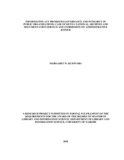| dc.description.abstract | Information is fundamental to all human endeavors, therefore it is necessary that required
information is provided to citizen either proactively or when requested as long as it is not
the classified information The objectives of the study were to examine the use of Access
to Information Act in promoting governance and integrity; establish the level of
awareness of Access to Information Act, 2016; identify the avenues which public
institutions use in promoting access to information and examine the value of access to
information. The study used a total target population of 129. This study opted to use
census sampling method since the population was not vast; the number of staff members
was small. The study adopted a mixed methods approach by using both qualitative and
quantitative research methods. The study employed the use of questionnaires and
interviews. On the use and awareness of the act a big number of the respondents affirmed
their awareness while a small number indicated lack of knowledge of the act, an
indication that awareness and knowledge of the act is high among the staff of the two
organization, they also indicated on major case the act has been used on to make
decision. Majority of the respondents agreed that there is need for civic education to
create awareness of the act. In bridging access to information gap, numerous approaches
are used; Huduma Kenya, Open Government Portal and National Council for Law are
actually bridging the information gap. Regarding value of access to information majority
of respondents agreed that Access to Information Act is a powerful tool in fighting
impunity and eventually reducing corruption. The study recommends that there is need
for the Commission on Administrative Justice, which has been given the mandate to
execute this Act, to carry out a vigorous awareness campaign so that people can be aware
of the acts existence and they can educate others also reap the benefits as this is their
constitutional right. In addition, the research recommends for a budgetary allocation for
putting up proper infrastructure for implementation, effective continuous public
education on the importance of Access to Information Act, the procedure of requesting
information needs to be laid down in a simplified manner. Behavior change among
Access to Information Officers in public offices is another recommendation. Others are
need for political will to abide and implement the Act. Proper information and records
management, training and support in digitization of records. In addition develop
regulations to operationalize the Act and have a simplified version of the Act. The Office
of the Ombudsman is expected to implement these recommendations. | en_US |



